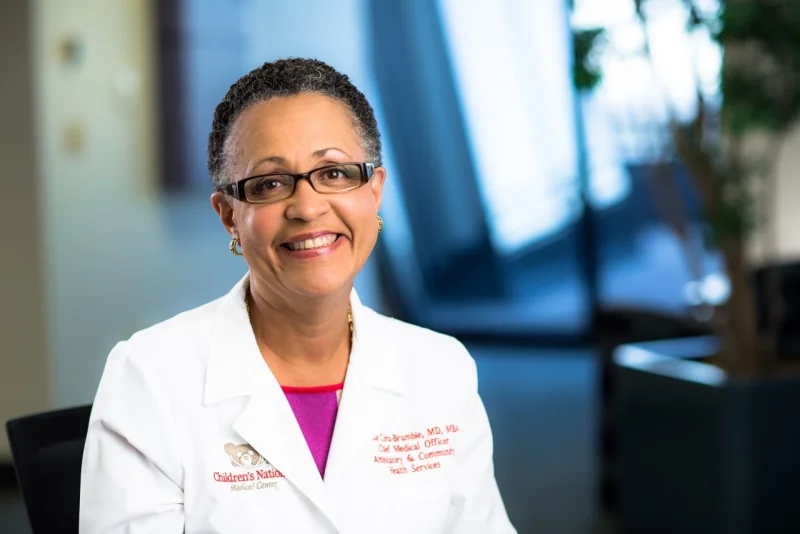Dr. Denice Cora-Bramble
The Culture of Prevention
Story By: Diane Alter
For almost 145 years, Washington, D.C.-based Children’s National Health System has been recognized as a preeminent leader in serving the nation’s children. Children’s National is led by an elite team of professionals who have devoted their careers to children’s medicine and is the only health system in the D.C. area designed exclusively for children. Children’s National is valued for the development and application of pioneering new treatments for childhood illness and injuries.
“All of us here truly care about our patients and their families,” Dr. Denice Cora Bramble, M.D., Executive Vice President and Chief Medical Officer of Ambulatory and Community Health Services, told Latino Leaders. She is the first woman and first Latino to hold the prominent position. “We really keep the child and their family at the center of what we do. This is a common bond we all share at Children’s National.”
The skilled team at Children’s National treats more than 450,000 patients each year, many who come from around the globe. Latest available data shows Children’s National performs over one million laboratory tests, 123,332 diagnostic imaging procedures, and 17,867 surgical procedures annually. In 2015, Children’s providers saw patients from 20 countries and provided $74.3 million in uncompensated care during the previous year. The largest non-government provider of primary care in the nation’s capital, Children’s National also delivers care through community-based outpatient centers and mobile health services in addition to its home base. The aim is to help make quality care more accessible to children and their families. A large majority of the patients treated at Children’s National and its centers come from the Latino community.
“Because our health care services focus on children and adolescents, we know more about how to address their physical and emotional needs,” Dr. Cora-Bramble said. “We are the premier provider of acute pediatric services in the Washington, D.C. area. Since a large number of patients we care for come from the Latino community, we pay careful attention to family perspectives, choices, values, and cultural backgrounds.”
Culturally competent care is crucial in treating many diseases that are prevalent in the Latino community. Latinos bear disproportionate burden of diseases such as asthma and obesity. Outreach efforts to address these conditions, including prevention and awareness programs, is key. More selective screenings, targeted programs, and adaptive measures such as teaching families how to shop wisely, what to buy, and healthy cooking methods that are accepting to a families’ culture is vital.
“It is more than just linguistics and being able to speak in their native tongue,” Dr. Cora-Bramble continued. “We offer care and prevention tools that are responsive to Latinos’ beliefs. We take into account families’ viewpoints and ethnic background. Being able to speak their native tongue is a distinct advantage. Families and patients truly appreciate it when we reach out in their own language, even if it is just a few words. Their faces light up in recognition and solidarity. Without question, precise explanations and instructions are welcome and imperative.”
Many Latinos come to the United States for a better life. Yet as Dr. Cora-Bramble explained, the new opportunities available to them do not always work in their favor. The plethora of fast-food options and myriad means of transportation can contribute to health challenges. “Many find themselves eating more and walking less,” Dr. Cora-Bramble noted. “We educate our families on how to have a mindful and healthy transition, and how to find the best of both worlds.”
A widely recognized and accomplished leader in the Latino community, one of Dr. Cora-Bramble’s goals is to write a book about leadership development. “I have mentored many over the years,” she said. “I have learned about the importance of resilience, what it takes to survive and thrive, and what emerging leaders must learn along the way.”

